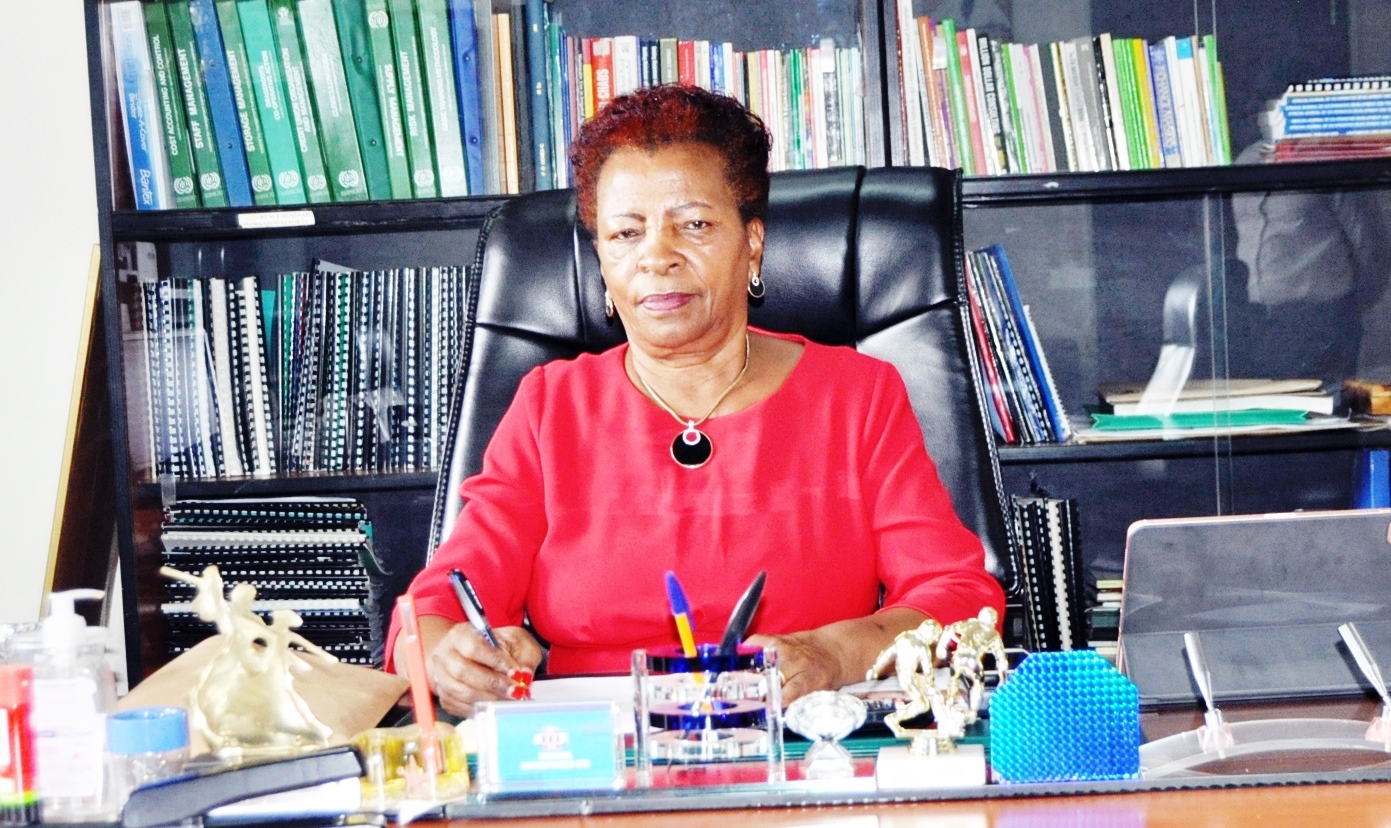Prof Esther Gicheru, the Deputy Vice-Chancellor (DVC) for Finance, Planning and Administration at the Co-operative University of Kenya (CUK), is a story of wit, zeal and resilience.
She traces her journey in the cooperative sector that spans over four decades.
It is a journey of a lifetime to say the least. She has known no other career; having joined the movement in 1976 as a young employee, growing through the rank and file to finally land the DVC job at the only university in Kenya that has roots in the cooperative movement.
Before then, growing up, Prof. Gicheru used to deliver coffee from the family farm to the factories with the least idea of what they do. She was simply supplying the cherries for all she cared.
“That time, I didn’t understand how they work. All I knew was that they were serving us well because we would deliver and the factory will do the rest for us in terms of grading and marketing,” recounts Prof. Gicheru.
In a recent exclusive interview with Sacco Review in her office, Prof. Gicheru, Associate Professor in Cooperative Management and Organization Development, said her first meaningful encounter with the sector was when she got employed as a cooperative officer in the then Ministry of Co-operative Development.
She had just graduated from the University of Nairobi (UoN) with her first degree in Bachelor of Science in Agriculture.
She was attached to the Rural Credit Department, which basically meant she was directly involved in funding cooperatives in the rural areas.
Her work was to supervise the way the cooperatives were utilizing the money, educate them on financial management, and teach them the cooperative principles.
That worked magic. Due to her exemplary work, Prof. Gicheru was sooner promoted to Senior Cooperative Officer in 1978, then later Assistant Cooperative Commissioner between 1980 and 1981, which is equivalent to Deputy Cooperative Commissioner. She was now heading the Rural Credit Department.
Among the things she did was to approve loans to cooperatives, the funding coming from the World Bank and USAID.
The Co-operative Bank was the link where she sat in various loan committees, which were mandated to approve loans that were given to farmers in kind and not cash.
“My life at the ministry … was really good because you are giving credit, you are going out to supervise to see what they (farmers) are doing, and you go and find happy farmers waiting to harvest the produce,” she said.
However, she also encountered a number of challenges, key among them being failure to repay some of the loans.
“Some areas were paying, but I remember particularly cooperatives from Western and Nyanza; they refused to pay the loans saying USAID means Usaidizi (to help),” recalled Prof. Gicheru with a wry smile.
Another challenge was farmers selling the farm inputs they were given instead of using it to improve their crops.
From ministry to academia
Her stint at the ministry headquarters ended in 1987 when she successfully applied for the position of Principal of the Co-operative College of Kenya, which was a small college within the ministry only offering certificate and diploma programmes. It has since grown to become the Co-operative University of Kenya (CUK).
Form four leavers would be trained up to diploma level (Pre-service Diploma) before being deployed directly to the ministry as permanent employees.
“Their jobs were guaranteed and they would just go to the ministry and start working there. That is how many of them, many of whom are currently retiring, came through the college,” she narrates.
Due to the growth of the cooperative movement, notably the financial cooperatives (Saccos), Prof. Gicheru says there was need for higher qualifications and training, hence the need to introduce Degree programmes, which they started in 1995.
They initially opened a campus in Nairobi city centre to offer the degree programme, to be administered by the Jomo Kenyatta University of Agriculture and Technology (JKUAT).
To complete the transformation, the college had to be changed from a ministry department to a SAGA (semi-autonomous government agency) through an Act of Parliament, so that operations may be better run by cutting short the bureaucracy.
This was realized in 1998 under her stewardship. She now rose to the position of Director.
Sky not the limit
Prof. Gicheru gave her staff the option to remain in the college, or go back to the ministry.
She did not stop there. Another idea came to change yet again from a SAGA to a full-fledged public university. Together with a team of like-minded scholars, they began the journey.
They worked closely with the then Commission for Higher Education, now the Commission for University Education (CUE), to develop a concept paper that went through Parliament. In 2011, the college was established as a constituent college of JKUAT.
The university was awarded a charter in October 2016.
Prof. Gicheru was then appointed the acting principal of Co-operative University College of Kenya in 2012.
“It took a process of about three years to be upgraded to a university college constituent to JKUAT, yet we wanted to retain the name ‘Co-operative’. We wanted our identity as the Co-operative University of Kenya,” remarked a resolute Prof. Gicheru.
Thus, despite being transformed to a university constituent college, they still negotiated with CUE to keep their ancient certificate and diploma courses, which they were allowed after a protracted contention.
To date, they still run the programmes, the only change being the durations, which were reduced by half from the initial 3 years.
Prof. Gicheru reveals that she had to force staff to go back to class to match the new university status. However, she faced a lot of resistance despite the university paying for their Masters and PhD studies.
Personally, she had already in her possession the requisite credentials.
“I enrolled for my Master’s and later Ph.D. By the time we were to transition to a university college, I already had earned my Ph.D.”, said Prof. Gicheru.
The resistance was stiff and acrimonious. She had to play another card. Those who had not completed studies during the transition were employed on contract, which was only renewed after completion of their respective Master’s and Ph.Ds.
Meanwhile, her sights were set higher.
“I started doing research, started publishing … so that I could be promoted to Professorial position. I was first recruited as a Senior Lecturer then to Associate Professor between 2012 and 2013,” she recollects.
When a new principal was appointed to lead the constituent college, Prof. Gicheru was given the opportunity to start the Institute of Co-operative Development (ICD) in 2014, where she became its first Director; a position she held till 2018 when she became the DVC Finance, Planning and Administration.
Prof. Gicheru has won several awards due to her outstanding contribution to the cooperative movement, served and continues to serve in various international boards.
She got the most respected international award in 2007- the Rochadale Pioneers’ Award (RPA) – which is an International Co-operative Alliance (ICA) award.
Her other accolades are two presidential awards; Head of State Commendation (HSC) in 2008 and the Order of Grand Warrior of Kenya (OGW) in 2016.
She served in the ICA board, which is the highest organ of the cooperative movement globally for 4 years to represent gender in Africa; and while there, she served in various committees like the Human Resources of the ICA Board.
Prof. Gicheru is still the Chair of the Gender Equality Committee of the ICA-Africa.
She holds a Master’s degree in Co-operative Management and Organization Development from Leicester University, United Kingdom, and a doctorate from Cebu Doctors’ University in the Philippines.
By Roy Hezron
Get more stories from our website: Sacco Review.
For comments and clarifications, write to: Saccoreview@shrendpublishers.co.ke
Kindly follow our Facebook Page: Sacco Review Newspaper for timely updates.




One thought on “Prof Gicheru: From coffee errand girl to leading global cooperator”
Comments are closed.